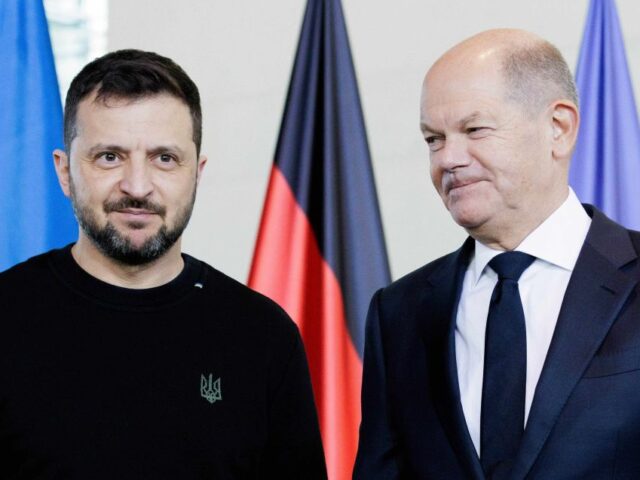President Zelensky’s proposed ‘victory plan’ openly criticised by a NATO leader for the first time, as the possibility of the country joining the alliance while at war with Russia rejected out-of-hand by the German Chancellor.
German Chancellor Olaf Scholz used a television interview to make a surprisingly frank rebuttal to President Volodymyr Zelensky’s ‘Victory Plan’, the document the Ukrainian leader has been flogging around Western capitals, and which was made largely public for the first time last week.
Putting his rejection bluntly, Scholz said: “a country that is at war cannot become a NATO member”.
Zelensky’s Victory Plan, amounting to a condensed shopping list of long-standing Ukrainian asks, makes its key plank an “unconditional invitation right now” by NATO for the country to be admitted as a full member.
While NATO has generally been encouraging to Ukraine through the Russian invasion, with future membership after the war has finished, immediate membership has never been on the cards. Quite apart from other concerns about Ukraine’s fitness to meet NATO’s other standards for membership, the possibility that joining during a war would bring the rest of the alliance irreversibly into the conflict has been articulated.
Nevertheless, while the response to Zelensky’s much-vaunted Victory Plan has been decidedly cool — with one notable exception — his NATO allies haven’t publicly criticised it until now. Scholz broke that cordon, telling channel ZDF talk show Maybrit Illner: “I believe that it is very important to realise that a country that is at war cannot become a NATO member… Everyone knows that, there is no disagreement about it.”
Scholz said even starting membership talks so soon would be incorrect, given “with NATO, the invitation is usually linked to membership pretty quickly”, remarking “That is a process that is not pending now”. He said: “there is currently no need for a new decision”.
The German leader is “very serious” about preventing war between NATO and Russia, he said, stating on these issues “That is something I am very clear about and will not change my position”. And on the question of whether to allow Ukraine to use European long-range bunker-buster missiles; “I will not act rashly”.
These declarations do not mean, however, that NATO will make decisions for Ukraine over its head, he reassured. The German stated NATO members had reaffirmed this point in recent talks in Berlin, stating: “There will be no decision for Ukraine over Ukraine”.
These blunt remarks are not the first time Scholz has spoken out on Ukraine’s NATO membership requests, indeed, he has been one of the most outspoken in the alliance on the question. As reported back in May 2023, Scholz walked out of a G7 meeting in Japan to declare Ukraine couldn’t join NATO even if its members agreed, given — as he claimed — it didn’t meet the alliance’s membership requirements.
For the time being, the German Chancellor had said, the important issues were securing Ukraine’s borders, and agreeing future post-war security guarantees. As for NATO membership: “NATO’s criteria include a whole series of conditions that Ukraine cannot currently meet.” As reported at that time of what those requirements may be:
In 1997, the American State Department laid out a list of five “minimum requirements” for NATO membership candidates, which included “all of Europe’s emerging democracies that share the alliance’s values and are ready to meet the obligations of membership.”
The requirements demand that a prospective candidate upholds democracy, including “tolerating diversity”, is “showing progress” towards a developing a market economy, has a military under “firm civilian control”, is a “good neighbour” and respects the sovereignty of other nations, and finally is “working toward compatibility with NATO forces”.
The State Department said that such criteria did not constitute a firm “checklist”, saying that the “key determinant for any invitation to new members is whether their admission to NATO will strengthen the alliance and further the basic objective of NATO enlargement, which is to increase security and stability across Europe.”
Ukraine faces similar problems in its requests to join the European Union, which have been voiced more frequently since Russia’s invasion. New EU states have to meet the Copenhagen Criteria, requirements that include “stability of institutions”, “a functioning market economy”, the ability to uphold EU law, and protections for democracy, human rights, and minorities. As reported in September 2023 on these questions:
Many of these may be difficult to achieve during a major war, where to supposedly further the undeniably important goal of defeating the Russian invasion and occupation elections have been suspended, opposition political parties outlawed, military-age males banned from foreign travel, and corruption issues persist.
Cutting through talk of Ukraine joining the European Union despite these issues as a simple matter of obeying the “call of history” and ignoring the Union’s own rules, Hungarian leader Viktor Orbán said “very difficult questions” had to be asked.
Speaking to Hungarian radio this week, Reuters reports, the prime minister said: “We cannot avoid the question – when during the autumn we will have negotiations in Brussels about the future of Ukraine – whether we can actually seriously consider membership for a country, to start accession talks with a country that is at war.”

COMMENTS
Please let us know if you're having issues with commenting.